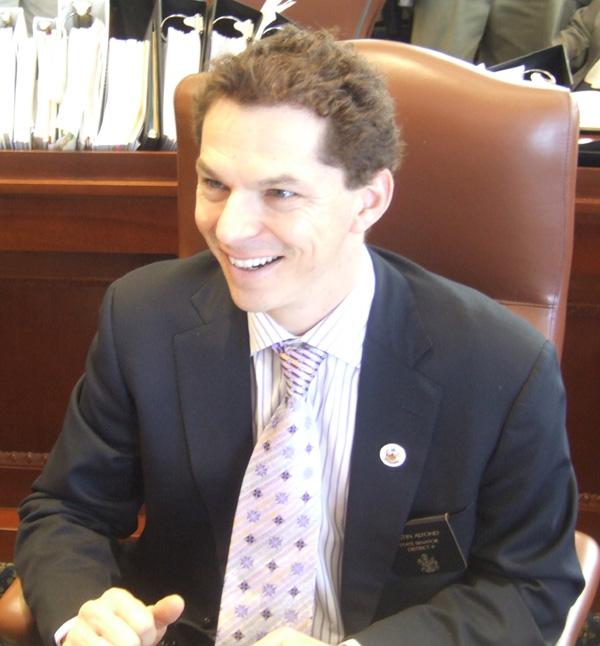AUGUSTA — Work force training, education investments, energy and health care reform and research and development will be the focus of Maine’s new Democrat-led Legislature, party leaders said at a State House news conference Wednesday.
However, with looming problems, including projected shortfalls in current and future state budgets and a $100 million gap between projected spending and revenue in this year’s Department of Health and Human Services budget, there were few policy specifics presented.
“Together, we face some serious challenges,” said Senate President Justin Alfond, D-Portland. “We can’t ignore that. We won’t ignore that. But we do not have to disparage our workforce, our schools, denigrate our state or put down the very qualities that make Maine special.”
Top Democrats did not take a firm stand on tax increases or changes to Maine’s income tax structure.
Senate Majority Leader Seth Goodall, D-Richmond, said as a budgetary solution, Democrats will be making “wise decisions around programs that may need to be reduced as well as looking at opportunities for revenue.”
But Gov. Paul LePage will be an obstacle should Democrats look for tax increases: Adrienne Bennett, the governor’s spokeswoman, said he won’t be considering any in his budget proposal for the next two-year budget cycle.
Democrats focused mostly on plans that members of both parties could get behind. Senate Assistant Minority Leader Roger Katz, R-Augusta, said he saw many similarities to the agenda for the previous two years when Republicans controlled the Legislature.
Katz said goals for his party include keeping in place certain reforms enacted last session, pursuing regulatory reform without rolling back environmental standards and reducing energy costs. On much of that, he thinks Democrats and Republicans can find common ground.
“The message for me is that we were sent here to work together and shame on us if we don’t,” Katz said.
In that vein, Alfond, LePage and many in their parties are focusing attention on Maine’s “skills gap,” which refers to the frequent complaint from employers that they have jobs to fill but not enough qualified workers to fill them. At the press conference, Alfond cited numbers from a Southern Maine Community College report that said 4,000 high-wage jobs will go unfilled between 2008 and 2018 because of the gap.
“For those Mainers with advanced degrees and specialized knowledge, we want you to know we will take specific action to attract innovators and entrepreneurs to our state who want your skills and talent,” Alfond said. “They will come to Maine because this is where you are.”
Alfond also talked about investing in public education — not just K-12, but early childhood, saying it will develop a better-prepared workforce.
House Speaker Mark Eves, D-North Berwick, highlighted his party’s intent to save Mainers money on energy, including “short-term and long-term solutions like supporting energy efficiency now and diversifying our energy resources for the future.”
Eves also said Republican-led health care reform, Public Law 90, had unintended effects on individuals and small businesses and cited a Bar Harbor pizzeria and movie theater that saw rates go up 95 percent after the law went into effect.
“We know this was not the intent of our Republican colleagues when they passed the law, and now we have the opportunity to work on some of our necessary fixes together,” he said.
House Majority Leader Seth Berry, D-Bowdoinham, said Democrats want to change the Republican-led health care reform law, not repeal it. He said expanding the state’s ability to scrutinize insurance rate increases will be a Democratic priority.
Republicans have argued that the health care reform law also has helped some business that saw insurance rates drop or increase at a slower rate than in previous years.
Katz, the Republican leader, said it is a mistake to make policy based on anecdotal information. But he also said he would be open to working with Democrats to smooth out rates and improve the law.
“There are clearly businesses that have seen increases in premiums,” Katz said. “The challenge for us is how you deal with those rough edges.”
The Democratic leaders also said they want to fix crumbling roads and bridges and improve research and development, investments that they said would create jobs.
Leaders were mum on what form that may take, however. LePage has refused to issue certain voter-approved bonds, a common vehicle for transportation spending and providing research and development money for universities and labs.
Assistant House Republican Leader Alexander Willette, R-Mapleton, accused Democrats of being “wishy-washy.”
“It was funny. I saw the press release and it said, ‘We’re going to release our agenda,’ ” Willette said. “I didn’t really hear any agenda.”
Berry, the Democratic House Majority Leader, said the governor must submit his budget proposal before specifics are talked about. “Everything’s on the table” when it comes to taxes, he said.
Berry did hint at opposition if LePage comes back with a similar tax proposal to one passed in 2011 that was opposed by many Democrats who called it tax cuts for the rich. The 2011 package included raising the estate tax exemption from $1 million to $2 million, which benefited wealthier taxpayers, but it also removed any tax burden for around 70,000 low-income Mainers.
“If the same proposals are voiced again, I think you’re likely to see a push back from Maine people,” Berry said. “It’s the people’s voice that comes first in this process.”
But LePage took issue with that at the end of a press conference in his State House office Wednesday.
“The Maine people are going to rebel? I’ll bet him $1,000 in cash that Maine people will not rebel against a tax cut,” the governor said. “And if he thinks they’re going to rebel against me, that rebellion I’ll take.”
State House Bureau Writer Michael Shepherd can be contacted at 620-7015 or at:
mshepherd@mainetoday.com
Send questions/comments to the editors.


